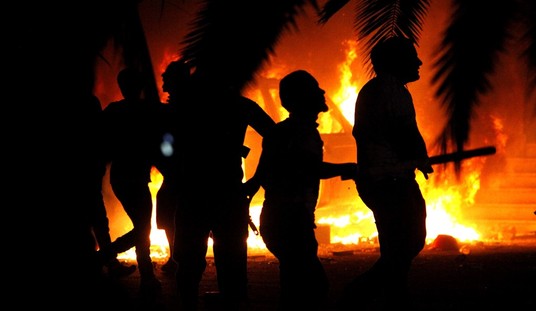While the US continues its bombardments in a country that the Defense Secretary today admitted posed no national-security threat and was not a “vital national interest” to the US, an equally brutal crackdown on a rising rebellion continues in Syria, a nation that helps support and control much of the region’s terrorism. Demonstrations in the city of Latakia resulted in Syrian security forces opening fire on protesters, while Bashar Assad’s government blamed the shooting on “unknown armed gangs.” Either way, a least 12 more died from the latest violence:
Dozens of people have been killed in a number of Syrian cities after protests against President Bashar al-Assad’s regime flared up more than a week ago.
Ten people, including members of the security forces, residents and two members of “armed elements” died in the Latakia violence, the state-run news agency said, adding that at least two people were killed by rooftop snipers. Around 200 others, mostly members of the security forces, were reported to have been injured.
Ammar Qurabi, an exile in Egypt who heads Syria‘s National Organisation for Human Rights, told the Associated Press that dozens of people had protested in Latakia before attacking the Ba’ath party’s offices in the city.
Demonstrators also attacked a police station and the Ba’ath party offices in the town of Tafas, six miles (10km) north of the southern border city of Daraa, the epicentre of the anti-government protests.
An activist in Daraa told AP that up 1,200 people were still holding a silent sit-in the al-Omari mosque.
Assad’s father had a unique way of dealing with protests. Almost thirty years ago, Hafez Assad bombed the city of Hama to end unrest there, killing 10,000 people and setting a bloody example of how far the Assads would go to hold power. His son has yet to order anything of that scale, but the rules of engagement keep getting more loose for his security forces, and it’s only a matter of time before a large-scale attack civilians will be ordered — and necessary — to preserve the regime.
Where exactly is the White House on Syria? Barack Obama seemed anxious to push an American ally out of power in Egypt for far less, and started a war with Libya for not much more. The reticence to confront Syria, where the US and the West have a good argument on national security, comes from the Obama administration’s feckless policy regarding Assad over the last two years, reports the New York Times:
Indeed, the crackdown calls into question the entire American engagement with Syria. Last June, the State Department organized a delegation from Microsoft, Dell and Cisco Systems to visit Mr. Assad with the message that he could attract more investment if he stopped censoring Facebook and Twitter. While the administration renewed economic sanctions against Syria, it approved export licenses for some civilian aircraft parts.
The Bush administration, by contrast, largely shunned Damascus, recalling its ambassador in February 2005 after the assassination of a former Lebanese prime minister, Rafik Hariri. Many Lebanese accuse Syria of involvement in the assassination, a charge it denies.
When Mr. Obama named Mr. Ford as his envoy last year, Republicans in the Senate held up the appointment for months, arguing that the United States should not reward Syria with closer ties. The administration said it would have more influence by restoring an ambassador.
But officials also concede that Mr. Assad has been an endless source of frustration — deepening ties with Iran and the Islamic militant group Hezbollah; undermining the government of Saad Hariri in Lebanon; pursuing a nuclear program; and failing to deliver on promises of reform.
Some analysts said that the United States was so eager to use Syria to break the deadlock on Middle East peace negotiations that it had failed to push Mr. Assad harder on political reforms.
Putting aside Hariri’s assassination, we know this much about Syria. It allies itself with Iran, it supports Hezbollah in Lebanon, and Hamas in Gaza. They tried building a secret nuclear-weapons site that Israel destroyed a few years ago. The government of Syria gave shelter to terrorists operating in Iraq against our own troops over the last eight years. And Obama thinks that Assad is a partner for peace?
This looks disturbingly reminiscent of the summer of 2009, when Obama sat on the sidelines while Iranians filled the streets in opposition to the mullahcracy in the vain hope that his silence would give him an opportunity to talk the mullahs out of their nukes. We’re missing yet another opportunity to change the balance of power in the Middle East in our favor, while we bomb a country that had become more or less irrelevant to our interests for doing exactly what Assad is doing now.
Joe Lieberman thinks we should follow the “right” precedent and attack Syria, too, saying it will further cement us on the side of the “Arab people”:
So … what is the strategy here, exactly? We should attack nations at the behest of the Arab League rather than by considering our own national interests? We should conduct a war against all brutal Arab dictatorships? I like Lieberman, but the “precedent” he uses here is rubbish, or should be. We should have put pressure on Syria over the last two years, rather than sweet-talk them, and we should have used our military power to advance American interests. We arguable had some interest in Libya, but the time to use that military pressure is when it had some chance of success for a quick resolution, not a last-ditch effort to impose a stalemate that will ensure a long and bloody civil war. In Syria, our national interests and security interests are much more clear — as they are in Iran. We’ve managed to get ourselves completely backwards, mainly by using the line of thinking Lieberman uses in which the Arab “street” interests dictate our policies rather than our own interests.








Join the conversation as a VIP Member